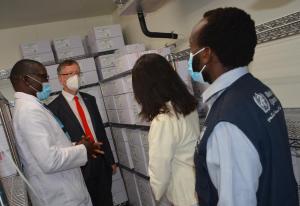WHO Statement on the Catholic Doctors Association of Kenya Advisory on COVID‐19 Vaccines and Treatment
Our attention is drawn to the falsehoods and uncertainties being circulated about this vaccine as unnecessary, questionable or unsafe. We want to reiterate that the COVID‐19 vaccines are an additional critical tool of protection in our hands, in addition to what we already have and can do, including, the protective measures of washing hands, keeping distance and wearing the mask.
We would also like to reiterate and assure the public that this vaccine and others recently developed are safe. They have indeed been developed and produced in record time, but the regulatory and scientific reviews of the vaccines have not been compromised. The Astra Zeneca vaccine produced by the Serum Institute of India and now being distributed in Kenya, has been reviewed and found safe not only by the WHO rigorous process but also by several stringent regulatory authorities, including the United States FDA and the European regulatory authority. In addition, many millions of these vaccines have now been administered across the world, and no additional safety signals have been received. So, let us be clear, these vaccines are safe! The vaccine is being offered to the Kenyan public on voluntary basis, no one will be forced to take it. We reassure the public that taking the vaccine is one of the surest ways to keep safe because COVID‐19 has life‐threatening consequences and has already killed millions of people. We appeal to the Kenyans that will receive this vaccine as part of the priority group to accept the vaccine as a recommended and effective tool against the virus.
On use of existing drugs like Ivermectin for the potential treatment of COVID‐19, WHO has currently not made any recommendation on its use but is closely following the research on this drug. With results from more trials coming in, WHO will conduct a systematic review with an independent panel and present the meta‐analysis to the guideline development group to consider. All changes to WHO recommended treatments follow this expedited but comprehensive review, and are shared with the public at the earliest possible time. Ivermectin is a broad‐spectrum anti‐parasitic agent, included in WHO essential medicines list for several parasitic diseases and is occasionally prescribed for treatment of some skin conditions. Currently, the only therapeutic recommended by WHO after scientific review is dexamethasone, which is now widely used across the world and in Kenya for the treatment of severe COVID‐19 cases.
As yet no other therapeutic has been found to be effective. Specifically, treatment with choloquine or hydrochloroquine have not been found beneficial in the treatment of COVID‐19. We note that across the world communities and leaders are seizing the opportunity to save lives by taking the vaccine. We are encouraged by the confidence and leadership provided by world religious leaders like Pope Francis and Pope Emeritus Benedict XVI who have received the first doses of the vaccine. In so doing, they have set the example needed for all people of the world that are seeking relief and treatment from this life‐threatening disease. We are also encouraged by the position taken by the Catholic Church in Kenya, which has rallied its support for the vaccine. Archbishop Anthony Muheria, Nyeri archdiocese has dismissed the rejection of vaccine and encouraged its faithful to embrace it.




